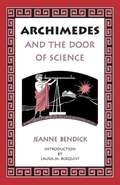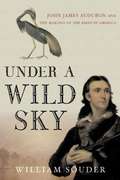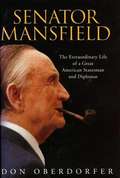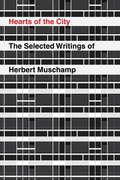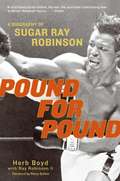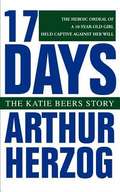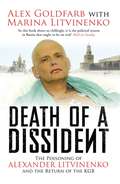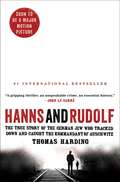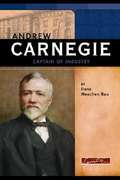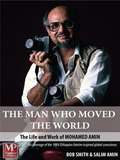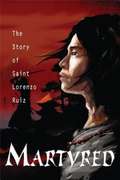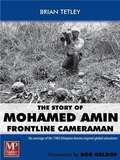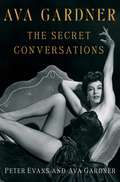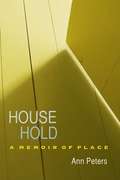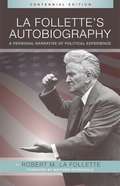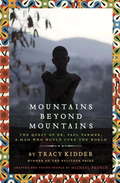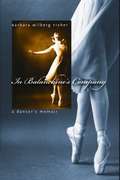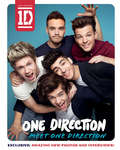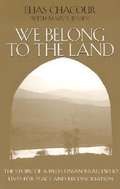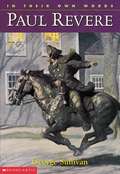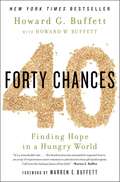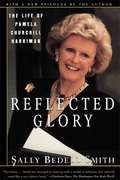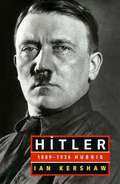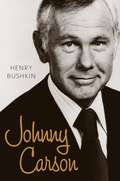- Table View
- List View
Archimedes and the Door of Science
by Jeanne BendickJeanne Bendick, through text and pictures, admirably succeeds in bringing to life the ancient Greek mathematician who enriched mathematics and all branches of science. Against the backdrop of Archimedes' life and culture, the author discusses the man's work, his discoveries and the knowledge later based upon it. The simple, often humorous, illustrations and diagrams greatly enhance the text.
Under A Wild Sky: John James Audubon and the Making of The Birds of America
by William SouderThe life and times of a complex genius and the masterpiece he created In the century and a half since Audubon's death, his name has become synonymous with wildlife conservation and natural history. But few people know what a complicated figure he was--or the dramatic story behind The Birds of America. Before Audubon, ornithological illustrations depicted scaled-down birds perched in static poses. Wheeling beneath storm-wracked skies or ripping flesh from freshly killed prey, Audubon's life-size birds looked as if they might fly screeching off the page. The wildness in the images matched the untamed spirit in Audubon--a self-taught painter and self-anointed aristocrat who, with his buckskins and long hair, wanted to be seen as both a hardened frontiersman and a cultured man of science. In truth, neither his friends nor his detractors ever knew exactly who Audubon was or where he came from. Tormented by a fog of ambiguities surrounding his birth, he reinvented himself ceaselessly, creating a life as dramatic as his fictionalizations of it. But when he came east at thirty-eight--broke and desperate to find a publisher for his Birds--he ran squarely into a scientific establishment still wedded to convention and suspicious of the brash newcomer and his grandiose claims. It took Audubon fifteen years to prevail in both his project and his vision. How he triumphed and what drove him is the subject of this gripping narrative.
Senator Mansfield: The Extraordinary Life of a Great Statesman and Diplomat
by Don OberdorferA spellbinding biography of one of the most powerful and dignified men ever to come to DC-Senator Mike Mansfield. Mike Mansfield's career as the longest serving majority leader is finally given its due in this extraordinary biography. In many respects, Mansfield's dignity and decorum represent the high-water mark of the US Senate: he was respected as a leader who helped build consensus on tough issues and was renowned for his ability to work across the aisle and build strong coalitions. Amazingly, he would have breakfast every morning with a member of the opposing party. Mansfield was instrumental in pushing through some of the most influential legislation of the twentieth century. He was at the helm when the Senate passed landmark legislation such as the Civil Rights Act of 1964, the Voting Rights Act of 1965, the creation of Medicare, and the nuclear test ban treaty. Mansfield played a crucial role in shaping America's foreign policy, corresponding with JFK about his opposition to the growing presence of the US in Southeast Asia. As ambassador to Japan, his conversations with Cambodia and China paved the way for Nixon's historic trip to China in 1972.
Hearts of the City
by Nicolai Ouroussoff Herbert MuschampFrom the late Herbert Muschamp, the former architecture critic of The New York Times and one of the most outspoken and influential voices in architectural criticism, a collection of his best work.The pieces here--from The New Republic, Artforum, and The New York Times--reveal how Muschamp's views were both ahead of their time and timeless. He often wrote about how the right architecture could be inspiring and uplifting, and he uniquely drew on film, literature, and popular culture to write pieces that were passionate and often personal, changing the landscape of architectural criticism in the process. These columns made architecture a subject accessible to everyone at a moment when, because of the heated debate between modernists and postmodernists, architecture had become part of a larger public dialogue. One of the most courageous and engaged voices in his field, he devoted many columns at the Times to the lack of serious new architecture in this country, and particularly in New York, and spoke out against the agenda of developers. He departed from the usual dry, didactic style of much architectural writing to playfully, for example, compare Frank Gehry's Guggenheim Bilbao to the body of Marilyn Monroe or to wax poetic about a new design for Manhattan's manhole covers. One sees in this collection that Muschamp championed early on the work of Frank Gehry, Rem Koolhaas, Zaha Hadid, Thom Payne, Frank Israel, Jean Nouvel, and Santiago Calatrava, among others, and was drawn to the theoretical writings of such architects as Peter Eisenman. Published here for the first time is the uncut version of his brilliant and poignant essay about gay culture and Edward Durrell Stone's museum at 2 Columbus Circle. Fragments from the book he left unfinished, whose title we took for this collection--"A Dozen Years," "Metroscope," and "Atomic Secrets"--are also included. Hearts of the City is dazzling writing from a humanistic thinker whose work changed forever the way we think about our cities--and the buildings in them.
Pound for Pound
by Herb Boyd Ray RobinsonHailed by critics as a long overdue portrait of Sugar Ray Robinson, a man who was as elusive out of the ring as he was magisterial in it, Pound for Pound is a lively and nuanced profile of an athlete who is arguably the best boxer the sport has ever known. So great were Robinson's skills, he was eulogized by Woody Allen, compared to Joe Louis, and praised by Muhammad Ali, who called him "the king, the master, my idol." But the same discipline that Robinson brought to the sport eluded him at home, leading him to emotionally and physically abuse his family -- particularly his wife, the gorgeous dancer Edna Mae, whose entrepreneurial skills helped Robinson build an empire to which Harlemites were inexorably drawn. Exposing Robinson's flaws as well as putting his career in the context of his life and times, renowned journalist and bestselling author Herb Boyd, with Ray Robinson II, tells for the first time the full story of a complex man and sport-altering athlete.
17 Days: The Katie Beers Story
by Arthur HerzogOn December 28, 1992, two days before her tenth birthday, Katie Beers disappeared. She had left for an outing with a close family friend, John Esposito, and her whereabouts remained mysterious as the year drew to a close and her family grew frantic, fearing the worst. On January 13th, Katie was found alive in a secret, dungeon-like vault beneath Esposito's Bay Shore, Long Island house. Families nationwide followed the story of Katie's heart-wrenching ordeal, as she bravely survived the isolation until her nearly miraculous rescue from a setting reminiscent of "The Silence of The Lambs." Katie's harrowing story reveals a chilling side of human nature, even in the seemingly peaceful suburbs. And her fate as the smiling survivor of a troubled family raises disturbing questions about the plight of children across America: children like Katie, whose trust can be so easily betrayed.
Death of a Dissident: The Poisoning of Alexander Litvinenko and the Return of the KGB
by Alex Goldfarb Marina LitvinenkoThe assassination of former Russian intelligence officer Alexander "Sasha" Litvinenko in November 2006 -- poisoned by the rare radioactive element polonium -- caused an international sensation. Within a few short weeks, the fit forty-three-year-old lay gaunt, bald, and dying in a hospital, the victim of a "tiny nuclear bomb." Suspicions swirled around Russia's FSB, the successor to the KGB, and the Putin regime. Traces of polonium radiation were found in Germany and on certain airplanes, suggesting a travel route from Russia for the carriers of the fatal poison. But what really happened? What did Litvinenko know? And why was he killed? The full story of Sasha Litvinenko's life and death is one that the Kremlin does not want told. His closest friend, Alex Goldfarb, and his widow, Marina, are the only two people who can tell it all, from firsthand knowledge, with dramatic scenes from Moscow to London to Washington. Death of a Dissident reads like a political thriller, yet its story is more fantastic and frightening than any novel. Ever since 1998, when Litvinenko denounced the FSB for ordering him to assassinate tycoon Boris Berezovsky, he had devoted his life to exposing the FSB's darkest secrets. After a dramatic escape to London with Goldfarb's assistance, he spent six years, often working with Goldfarb, investigating a widening series of scandals. Oligarchs and journalists have been assassinated. Ukrainian presidential candidate Viktor Yuschenko was poisoned on the campaign trail. The war in Chechnya became unspeakably harsh on both sides. Sasha Litvinenko investigated all of it, and he denounced his former employers in no uncertain terms for their dirty deeds. Death of a Dissident opens a window into the dark heart of the Putin Kremlin. With its strong-arm tactics, tight control over the media, and penetration of all levels of government, the old KGB is back with a vengeance. Sasha Litvinenko dedicated his life to exposing this truth. It took his diabolical murder for the world to listen.
Hanns and Rudolf
by Thomas HardingPart history, part biography, part true crime, Hanns and Rudolf chronicles the untold story of the Jewish investigator who pursued and captured one of Nazi Germany's most notorious war criminals.May 1945. In the aftermath of the Second World War, the first British War Crimes Investigation Team is assembled to hunt down the senior Nazi officials responsible for the greatest atrocities the world has ever seen. One of the lead investigators is Lieutenant Hanns Alexander, a German Jew who is now serving in the British Army. Rudolf Höss is his most elusive target. As Kommandant of Auschwitz, Höss not only oversaw the murder of more than one million men, women, and children, but was the man who perfected Hitler's program of mass extermination. Höss is on the run across a continent in ruins, the one man whose testimony can ensure justice at Nuremberg. Hanns and Rudolf reveals for the very first time the full, exhilarating account of Höss's capture, an encounter with repercussions that echo to this day. Moving from the Middle-Eastern campaigns of the First World War to bohemian Berlin in the 1920s to the horror of the concentration camps and the trials in Belsen and Nuremberg, it tells the story of two German men--one Jewish, one Catholic--whose lives diverged, and intersected, in an astonishing way.d through the lives of two men who grew up in parallel and yet opposing German cultures.
Andrew Carnegie: Captain of Industry
by Dana Meachen RauThis book is a biography of Andrew Carnegie who came to the United States from Scotland as a boy and grew up to become a steel producer, a great philanthropist, and the wealthiest man in the world.
The Cambridge Companion to Vaughan Williams
by Alain Frogley Aidan J. ThomsonAn icon of British national identity and one of the most widely performed twentieth-century composers, Ralph Vaughan Williams has been misunderstood as much as he had been revered; his international impact and enduring influence on areas as diverse as church music, film scores and popular music has been insufficiently appreciated. This volume brings together a team of leading scholars, examining all areas of the composer's output from new perspectives, and re-evaluating the cultural politics of his lifelong advocacy for the music-making of ordinary people. Surveys of major genres are complemented by chapters exploring such topics as the composer's relationship with the BBC and his studies with Ravel; uniquely, the book also includes specially commissioned interviews with major living composers Peter Maxwell Davies, Piers Hellawell, Nicola Lefanu and Anthony Payne. The Companion is a vital resource for all those interested in this pivotal figure of modern music.
The Man Who Moved the World: The Life and Work of Mohamed Amin
by Bob Smith Salim Amin Michael BuerkMohamed Amin was the most famous photo journalist in the world, making the news as often as he covered it. His coverage of the 1984 Ethiopian famine proved so compelling that it inspired a collective global conscience and became the catalyst for the greatest-ever act of giving--the "We Are the World" campaign. Unquestionably, it also saved the lives of millions of men, women and children. In a career spanning more than 30 years, Mo covered every major event in Africa and beyond, braving torture, surviving bombs and bullets to emerge as the most decorated news cameraman of all time. But his frenetic life was cut tragically short when, in November, 1996, hijackers took over an Ethiopian airliner forcing it to ditch in the Indian Ocean killing 123 passengers and crew. Mo died on his feet still negotiating with the terrorists.
Martyred
by Susan TanThis novelized account of the life of Saint Lorenzo Ruiz, a married Chinese-Filipino layman, retraces the series of events that lead up to his violent martyrdom for his refusal to renounce his Catholic faith in 17th century feudal Japan. Themes include: martyrdom, persecution, and history.
Mo The Story of Mohamed Amin: Frontline Cameraman
by Bob Geldof Brian TetleyThis is the story of the most honored photojournalist in media history. It contains a foreword by Bob Geldof. Amin's filming of the famine in Korem, in N. Ethiopia, was to inspire Bob Geldof and Live Aid.
Ava Gardner: The Secret Conversations
by Peter Evans Ava GardnerThis wickedly candid memoir that Ava Gardner dared not publish during her lifetime offers a revealing self-portrait of the film legend's life and loves in Hollywood's golden age. Ava Gardner was one of Hollywood's great stars during the 1940s and '50s, an Oscar-nominated leading lady who co-starred with Clark Gable, Burt Lancaster, and Humphrey Bogart, among others. But this riveting account of her storied life and career had to wait for publication until after her death, so concerned was Gardner with its frankness. "I either write the book or sell the jewels," Gardner told coauthor Peter Evans, "and I'm kinda sentimental about the jewels." The legendary actress serves up plenty of gems in these pages, reflecting with delicious humor and cutting wit on a life that took her from an impoverished childhood in North Carolina to the heights of stardom. Tell-all stories abound, especially when Gardner holds forth on her three husbands: Mickey Rooney, a serial cheater so notorious that even his mother warned Gardner about him; bandleader Artie Shaw, whom Ava calls "a dominating son of a bitch...always putting me down"; and Frank Sinatra ("We were fighting all the time. Fighting and boozing. It was madness. But he was good in the feathers."). She has just as much to say about lovers, such as Howard Hughes ("Howard was in my life, on and off, for more than twenty years, but I never loved him.") and George C. Scott ("I was scared to death of him.") and would-be lover John Huston ("He had a great life. He lived like a king. God, I miss him.")--all of whom get Gardner's unflinchingly honest treatment. "If I get into this stuff, oh, honey, have you got something coming," Ava told Evans. Get ready for the most revealing Hollywood autobiography in decades.
House Hold
by Ann PetersLike the house built by Ann Peters's father on a hill in eastern Wisconsin, House Hold offers many views: cornfields and glacial lakes, fast food parking lots and rural highways, Manhattan apartments and Brooklyn brownstones. Peters revisits the modern split-level where she grew up in Wisconsin, remembering her architect father. Against the background of this formative space, she charts her roaming story through two decades of New York City apartments, before traveling to a cabin in the mountains of Colorado and finally purchasing an old farmhouse in upstate New York. More than a memoir of remembered landscapes, House Hold is also an expansive contemplation of America, a meditation on place and property, and an exploration of how literature shapes our thinking about the places we live. A gifted prose stylist, Peters seamlessly combines her love of buildings with her love of books. She wanders through the rooms of her past but also through what Henry James called "the house of fiction," interweaving personal narrative with musings on James, Willa Cather, William Dean Howells, Paule Marshall, William Maxwell, and others. Peters reflects on the romance of pastoral retreat, the hazards of nostalgia, America's history of expansion and land ownership, and the conflicted desires to put down roots and to hit the road. Throughout House Hold, she asks how places make us who we are.
La Follette's Autobiography
by Robert M. La FolletteWritten in lucid, vigorous prose, "La Follette""'s Autobiography" is the famous Wisconsin senator's own account of his political life and philosophy. Both memoir and a history of the Progressive cause in the United States, it charts La Follette's formative years in politics, his attempts to abolish entrenched, ruthless state and corporate influences, and his embattled efforts to advance Progressive policies as Wisconsin governor and U. S. senator. With a new foreword by Matthew Rothschild, editor of "The Progressive"--the magazine that La Follette himself founded--the "Autobiography" remains a powerful reminder of the legacies of Progressivism and reform and the enduring voice of the man who fought for them.
Mountains Beyond Mountains (Adapted for Young People): The Quest of Dr. Paul Farmer, A Man Who Would Cure the World
by Tracy Kidder Michael FrenchMeet Dr. Paul Farmer, a Harvard-educated doctor with a self-proclaimed mission to transform healthcare on a global scale. Tracy Kidder follows Farmer's quest as he focuses his attention on some of the world's most impoverished people and uses unconventional ways in which to provide healthcare, to achieve real results and save lives.<P><P> Tracy Kidder's critically acclaimed adult nonfiction work, Mountains Beyond Mountains has been adapted for young people by Michael French. In this young adult edition, readers are introduced to Dr. Paul Farmer, a Harvard-educated doctor with a self-proclaimed mission to transform healthcare on a global scale. Farmer focuses his attention on some of the world's most impoverished people and uses unconventional ways in which to provide healthcare, to achieve real results and save lives.
In Balanchine’s Company
by Barbara FisherDuring her twelve years with Ballet Society and the New York City Ballet, Barbara Milberg worked under the direction of George Balanchine. She rose from corps de ballet to soloist, danced leading roles in Swan Lake and Illuminations, and performed in celebrated world premieres. In this observant and poignant memoir, she shares her recollections of Balanchine, his craft and his values, and lends insight into surprising aspects of his personality. Fisher gives readers a rare glimpse inside Balanchine's artistry, including vivid accounts of the makings of such important ballets as Schoenberg's Opus 34, AGON, and the world-famous Nutcracker. Told through the eyes of a young dancer in what seemed a truly magical place and time, In Balanchine's Company is ideal for ballet fans young and old. Rich in anecdote, insight, and humor, it offers a unique perspective on one of the twentieth century's cultural giants. Ebook Edition Note: All illustrations have been redacted.
One Direction: Meet One Direction
by One DirectionThe only 100% fully official annual--written in collaboration with One Direction. This is the annual for all 1D fans! Find out straight from Harry, Liam, Louis, Niall, and Zayn what they think about success, their musical influences, the making of their movie, their style, their amazing fans, and much more! With exclusive interviews, up-to-the-minute news, and fantastic never-before-seen photos, this is a must-have for all One Direction fans and a fantastic gift for any occasion!
We Belong To The Land: The Story of a Palestinian Israeli Who Lives For Peace and Reconciliation
by Elias Chacour Mary E. Jensen"Chacour's personal story offers a rare and valuable view inside contemporary Galilee." --San Francisco Chronicle "A wrenching and determinedly honest book that speaks eloquently and without hatred from the Palestinian side of a tragic conflict." --Kirkus Reviews "The conflict of being a clergyman and a Palestinian Arab in Israel forms the backdrop for this human drama as the author ... tries to serve as a spokesperson for fellow Palestinians against what they perceive as injustices imposed on them by a Jewish state ... this is recommended for those interested in a local perspective on the communal conflict in contemporary Israel." --Library Journal ELIAS CHACOUR, author of Blood Brothers, is an ordained priest in the Melkite Church. MARY E. JENSEN, the author of many books and articles, lived in Israel for a year of service and study.
Paul Revere (In Their Own Words)
by George SullivanThis book is a biography of the man made famous by a poem about the American Revolution, placing his life and work in its real historical context.
40 Chances
by Howard G BuffettIf you had the resources to accomplish something great in the world, what would you do?Legendary investor Warren Buffett posed this challenge to his son in 2006, when he announced he was leaving the bulk of his fortune to philanthropy. Howard G. Buffett set out to help the most vulnerable people on earth--nearly a billion individuals who lack basic food security. And Howard has given himself a deadline: 40 years to put more than $3 billion to work on this challenge. Each of us has about 40 chances to accomplish our goals in life. This is a lesson Howard learned through his passion for farming. All farmers can expect to have about 40 growing seasons, giving them just 40 chances to improve on every harvest. This applies to all of us, however, because we all have about 40 productive years to do the best job we can, whatever our passions may be. 40 Chances: Finding Hope in a Hungry World is a new book that captures Howard's journey. Beginning with his love for farming, we join him around the world as he seeks out new approaches to ease the suffering of so many. It is told in a unique format: 40 stories that will provide readers a compelling look at Howard's lessons learned, ranging from his own backyard to some of the most difficult and dangerous places on Earth.
Reflected Glory
by Sally Bedell SmithBased on more than 800 interviews with 400 sources, many of them intimates of Pamela Harriman, "Reflected Glory" strips away the mythology surrounding this amazing woman to show how she used cunning, hard work, and beauty to secure a place in the world of power and wealth. of photos.
Hitler: 1889-1936 Hubris
by Ian KershawThis is a biography of Hitler from birth to 1936, and his creation of The Third Reich, i.e., Nazi Germany.
Johnny Carson
by Henry BushkinFrom 1962 until 1992, Johnny Carson hosted The Tonight Show and permeated the American consciousness. In the ’70s and ’80s he was the country’s highest-paid entertainer and its most enigmatic. He was notoriously inscrutable, as mercurial (and sometimes cruel) off-camera as he was charming and hilarious onstage. During the apex of his reign, Carson’s longtime lawyer and best friend was Henry Bushkin, who now shows us Johnny Carson with a breathtaking clarity and depth that nobody else could. From the moment in 1970 when Carson hired Bushkin (who was just twenty-seven) until the moment eighteen years later when they parted ways, the author witnessed and often took part in a string of escapades that still retain their power to surprise and fascinate us. One of Bushkin’s first assignments was helping Carson break into a posh Manhattan apartment to gather evidence of his wife’s infidelity. More than once, Bushkin helped his client avoid entanglements with the mob. Of course, Carson’s adventures weren't all so sordid. He hosted Ronald Reagan’s inaugural concert as a favor to the new president, and he prevented a drunken Dean Martin from appearing onstage that evening. Carson socialized with Frank Sinatra, Jack Lemmon, Jimmy Stewart, Kirk Douglas, and dozens of other boldface names who populate this atmospheric and propulsive chronicle of the King of Late Night and his world. But this memoir isn't just dishy. It is a tautly rendered and remarkably nuanced portrait of Carson, revealing not only how he truly was, but why. Bushkin explains why Carson, a voracious (and very talented) womanizer, felt he always had to be married; why he loathed small talk even as he excelled at it; why he couldn't visit his son in the hospital and wouldn't attend his mother’s funeral; and much more. Bushkin’s account is by turns shocking, poignant, and uproarious — written with a novelist’s eye for detail, a screenwriter’s ear for dialogue, and a knack for comic timing that Carson himself would relish. Johnny Carson unveils not only the hidden Carson, but also the raucous, star-studded world he ruled.
